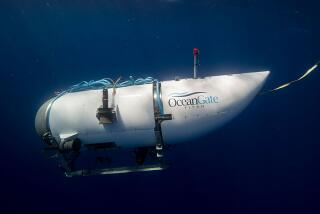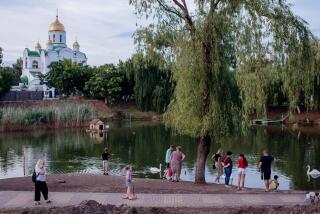In Russiaâs Far East, the Place Is Jumping
VLADIVOSTOK, Russia â Only a few months ago, most Russians considered getting through the daily perils of the post-Soviet transition enough of an adventure to keep the blood racing.
âNot anymore! Life is actually getting too predictable,â a sea-splashed Alexei Yanpol declared after taking the bungee plunge from a construction platform high above the chilly Pacific waters lapping Vladivostok.
Once the wildest and most dangerous of Russiaâs reform-buffeted cities, this Pacific Rim port of nearly 1 million is now prosperous enough and placid enough that locals feel the need for a new adrenaline outlet.
Australian equipment and local entrepreneurship have combined to provide the first bungee-jumping business east of the Urals, and the lines of young Russians willing to shell out $58--several daysâ pay for most people--for each fleeting free fall are providing a new barometer for measuring the regionâs economic success.
âThere was nothing for young people to do here,â observed Chris Hocking, whose New World Bungy of Adelaide, Australia, has provided the equipment and start-up advice for a Russian-American joint venture called Tarzan Ltd. âWe were pretty sure this was going to be a hit here, but even we were surprised by the crowds. There must have been 3,000 people gathered around the first day.â
Income statistics have long been useless in this country of tax dodgers, and the added pressures of bribe-seeking government bureaucrats and protection rackets serve to chase much of the thriving commercial activity underground.
But from the cafes packed with stylishly dressed young professionals to shops teeming with buyers to streets gridlocked by the highest per-capita car ownership in Russia, it is obvious that Vladivostok has emerged from its Communist-era depression. Bungee jumping is just the latest expression of social arrival.
The athletic pursuit that separates real adventurers from the fainthearted burst onto the local scene with a vengeance in mid-May. The day after Tarzan began selling jumps to all comers on the bustling public waterfront, gift certificates for the experience became the hot new prize giveaway, courtship gesture and birthday surprise.
Yanpol took the plunge to celebrate his 23rd birthday in the style his friends thought befitting his thirst for thrills. A jump was offered as the call-in prize by a local radio station, and the Stealth discotheque gave away a Tarzan ticket in a promotional drawing the night the leaping started.
âI never in my life would have chosen to do this of my own free will,â said Tatiana Pustovoitova, a 28-year-old clothing store owner who won the jump provided by the Stealth disco. âI must have been out of my mind to do it.â
As she shook the perspiration out of her rainbow-colored hair after taking the plunge in a patent-leather jacket, she expressed rare uncertainty among the jumpers about whether the experience had involved more fun than terror.
But like most of the young singles and couples paying what amounts to the monthly pension of their grandparents to leap from 150 feet above the water, Pustovoitova praised bungee jumpingâs arrival here as a sign of better times.
*
The local investors behind the venture are shy about publicity for tax reasons despite the huge attention their business is drawing. But they say they have identified a market that over the next two years could send to their beachfront platform about 1% of the local population, or about 10,000 people, many of whom can be expected to make the jump more than once.
âRussians are very eager and fearless,â Hocking said of the first customers, who get no special training except the advice to avoid looking down, relax and enjoy themselves.
Spurred by the lucrative leaps, New World hopes to join with the local partners to develop other aspects of adventure tourism, perhaps bringing white-water rafting, personal-watercraft racing and skydiving to the socially undernourished Far East, Hocking said.
Bungee jumping has been on offer in faraway Moscow on and off over the past two years at the Gorky Park amusement center on the banks of the murky Moscow River. At that summer venue, entrepreneurs have added a twist to the practice: reverse bungee, in which the client is tethered to the ground while a crane stretches the bungee cord skyward so the âjumpâ is actually a catapult high into the air.
*
While the scale of business in both Moscow and Vladivostok is negligible in terms of employment, the entrepreneurs note that every little bit of income-creation helps. Tarzan requires five employees to be on hand for every jump, and it rents a crane and operator from a city construction business at $400 a day.
Although Vladivostok has an extensive waterfront and harbors now open to the public, entertainment traditionally found in beachfront communities remains sorely lacking.
Coastal touring boats cost too much to outfit and operate to promise a quick return on an investment, so day-tripping into the inlets and islands beyond Golden Horn Bay is limited to a few ferries and aging naval vessels that have no catering and few comforts.
Bungee jumping, however, required a relatively small initial investment and promises to be profitable within weeks; the joint venture partners say 10 jumps per day is enough for them to break even--and theyâve been averaging 50.
âThis is just the beginning. This whole waterfront will eventually be full of things for people to do,â predicted Peter Tarrant, a New Yorker who has made his home here for five years. âPeople in the West still have this image of the city as a big mafia haven, but itâs a wrong impression. Thereâs a lot of good stuff happening here.â
More to Read
Sign up for Essential California
The most important California stories and recommendations in your inbox every morning.
You may occasionally receive promotional content from the Los Angeles Times.











